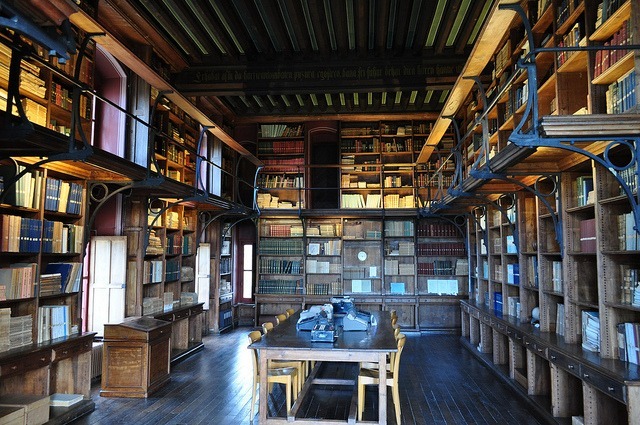
 The legal deposit is the obligation of a person or a group to provide one or several copies of their printed publications to the national library of the city or the country, where everyone can access them. The objective of this law is to safeguard all printed documents for future generations. These documents represent a unique and irreplaceable record of the activities and the life of the city or the country.
The legal deposit is the obligation of a person or a group to provide one or several copies of their printed publications to the national library of the city or the country, where everyone can access them. The objective of this law is to safeguard all printed documents for future generations. These documents represent a unique and irreplaceable record of the activities and the life of the city or the country.
The nature of the legal deposit depends on its location: in some places it is a legal obligation, and in others it is optional but strongly recommended. In the past, the legal deposit existed mainly for censorship: only authorized documents were published.
What is the situation in Switzerland?
The legal deposit is not a federal obligation. However, one of the missions of the Swiss National Library is to possess a copy of every Swiss publication. For this, the National Library has signed a contract with the two associations of editors: l’Association Suisse des Diffuseurs, Editeurs et Libraires (ASDEL) and the Schweizer Buchhändler und Verleger-Verband (SBVV).
Three of the 26 cantons of Switzerland passed a law which makes the legal deposit obligatory:
The legal deposit in Geneva
In Geneva, the legal deposit was first created in 1539 by Jean Calvin, leader of the Protestant reform. It was initially intended to facilitate the exercise of censorship. In 1908, this law was repealed because it was in opposition to the new Constitution. At this time, the library asked for voluntary deposits, and also bought some documents. In 1967, the Grand Conseil (state council) decided to reestablish the legal deposit, because many documents were missing from the Geneva records. However, this time, the objective was limited to record-keeping and preservation.
What kinds of documents are concerned?
All printed documents are included in the legal deposit; there is no distinction of format. We can find books, periodicals, posters, maps, reports, programs... The goal is to establish a complete collection of local publications.
However, temporary documents are not included in the law: bills, postcards, business cards, advertisements, user manuals... Similarly, reprints of previously deposited documents are also excluded.
This law concerns only the printed documents. It does not apply to multimedia and electronic documents such as DVDs, CDs or Internet documents. At this time there are no measures to protect these kind of documents, in spite of their growing importance. If nothing is done, these documents will be lost from collective memory, which might pose a problem in the future.
The deposit of documents
Every document that the Geneva Library receives is listed in Rero, a library network for Western Switzerland. Most public companies, universities, specialized organizations and federal institutions are in this network. New documents are also listed in the Geneva bibliography, which is published every year. This bibliography is not available to the public, but all the documents it contains can be found in Rero.
Who is concerned by this law?
Editors and printers are the most concerned by this law. Additionally, all other people and groups who publish, including individuals, associations, organizations and public administrations must deposit a copy of each of their printed publications. The deposit generally takes place between the date of publication and the fifteenth of the following month, at the following address:
Bibliothèque de Genève
Dépôt légal
Promenade des Bastions
1211 Genève 4
Each deposit is confirmed in writing.
A second copy of the publication can be deposited at the Swiss National Library. Depositing copies in two different libraries provides additional security.
Documents and preservation
The Geneva legal deposit receives approximately 1,300 books and brochures, 1,000 posters and 1,000 periodicals every year. It includes about 1,500 titles of periodicals (magazines, and newspapers) which are still being published currently, and even more that are now out of print.
Special measures are taken to ensure the long-term protection of book covers and particularly valuable documents: storage in a secure environment, or digitalization, depending on the type and the quality of the item.
The role of the legal deposit
The legal deposit plays an important role in safeguarding our cultural heritage and ensuring the longevity of our local collective memory. To become truly complete, it should include electronic documents, which occupy an increasingly important place in our society.
Sources
http://www.ville-ge.ch/bge/doc/depot_legal_2014.pdf
http://www.ville-ge.ch/bge/presse/2014-03-Depot-legal/guide-de-visite.pdf
http://www.ville-ge.ch/bge/collections/imprimes-depot-legal.html
Always good to know... Can you tell me if having a published document in the legal deposit is a way to assert the writer's intellectual property rights (similar to the work of WIPO)?